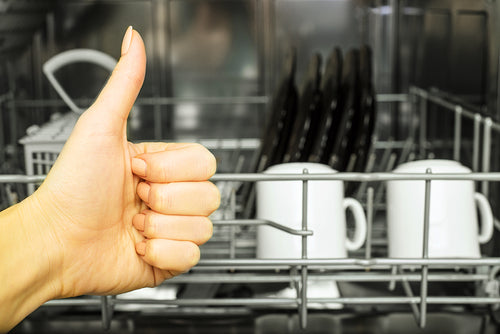
Aug 17 , 2018
How You Benefit from Having a Dishwasher Water Filter
Water filters can help make tap water cleaner and safer to drink. However, the mineral-free water that filters produce can have other benefits as well. In particular, using filtered water to wash dishes in a dishwasher can yield some surprising results. If you dont yet use a water filter in your dishwasher, the following benefits might make you change your mind:
Your Dishes Come Out Looking Cleaner
Regardless of how well it was treated, water from community water systems usually contains dissolved minerals. These minerals leach into the water as it travels through the water system and into your house. Experts call this mineral-rich water hard water, and it typically contains elevated concentrations of magnesium and calcium, as well as other chemical contaminants.
When you wash your dishes with hard water, these minerals can harden on the surface of glass and silverware as the water evaporates. These deposits of calcium and magnesium are what make up the hard, white residue we often refer to as hard-water stains.
Water filters can remove most of the dissolved minerals and chemicals from hard water to create soft water. When you use soft water in your dishwasher, mineral deposits are less likely to form, leaving your dishes looking cleaner for longer.
Clogs Form Less Quickly

The same mineral deposits that build up on dishes and utensils can also grow in the pipes and water-bearing components that are in your dishwasher. Over time, these deposits, also called scale or limescale, build up and harden in the piping, causing it to clog. While some of these clogs might be easy to address with a component change, others might cause issues for the remainder of the lifetime of your machine.
Metal Components Dont Rust as Quickly
Growing scale can cause more than just clogging. When it builds up on metal components, the scale can strip or corrode away the protective layers that help protect these components against rust. Additionally, the growing scale also attracts iron and rust particles, which are what give limescale found in pipes its usual reddish coloration.
As these particles corrode in close contact with the metal of the dishwashers components, they can threaten the integrity of the metal through a process called pitting corrosion. Pitting corrosion causes small holes to form, and these small holes expose more of the underlying metal to corrosion, which can lead to a runaway rusting effect.
Moving Components Last Longer
Scale can also build up on moving components such as pumps, valves, and impeller blades. As the scale deposits get thicker and thicker, they can impede the motion of these moving components. Fast-moving components can also grind against the rough scale, causing them to weaken or lose their optimal shape.
Your Dishwasher Works More Efficiently
As clogs form and components wear down due to scale, your dishwasher starts to use more energy to produce the same cleaning effect. This can drastically increase both the amount of water it uses and the amount of electricity it requires to complete a wash cycle.
If you use a self-heating dishwasher, the scale can also build up on the elements that heat up the water to allow it to clean dishes more effectively. As the scale thickens, it forms an insulating layer around the elements, which causes the dishwasher to use more energy to heat the water to the same temperature as it used to. Your dishwasher might not even be able to heat the water to the right temperature, which reduces cleaning performance and forces you to use more or longer washing cycles.
The reduced efficiency can also cause your dishwasher to have to work harder. This increased strain on the machine can cause components to fail sooner than normal and render your dishwasher useless.
You Use Less Soap

Improved dishwasher performance and less scale on your dishes both add up to better cleaning. This improved cleaning effectiveness allows you to cut your soap use down to as little as 50 percent. While using less soap might seem like a small benefit, the savings you experience through the lifetime of your dishwasher can add up to a tidy sum.
Choosing the Right Water Filter
Different households and dishwashers require different water filtration solutions. If, for example, your dishwasher is not self-heating and uses hot water from your homes hot-water supply, then youll probably want to get a whole-house water filter.
Whole house water filters connect to your homes water main and soften water for the entire household. These filters are especially useful in areas where the dissolved minerals in the water from the supply system are much higher than normal. They have the added benefit of also reducing the buildup of scale in your household piping system.
If, on the hand, you own a self-heating dishwasher and live in an area where the water is relatively soft, and you just want to limit scale buildup in your machine, then another filtration solution might serve you better. An in-line water filter or reverse osmosis filter might work well in this situation, as long as you make sure you dont run hot water through the lines theyre in. Doing this also lets you keep running unfiltered water through the rest of your household since calcium and magnesium in low amounts usually contribute to better tasting, nutrient-containing water.


